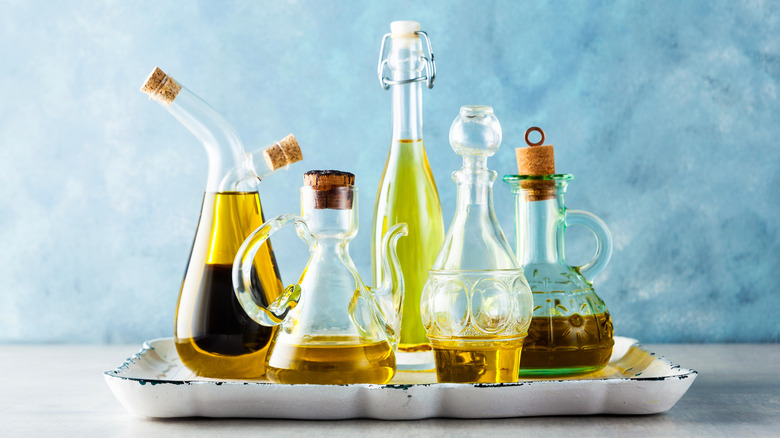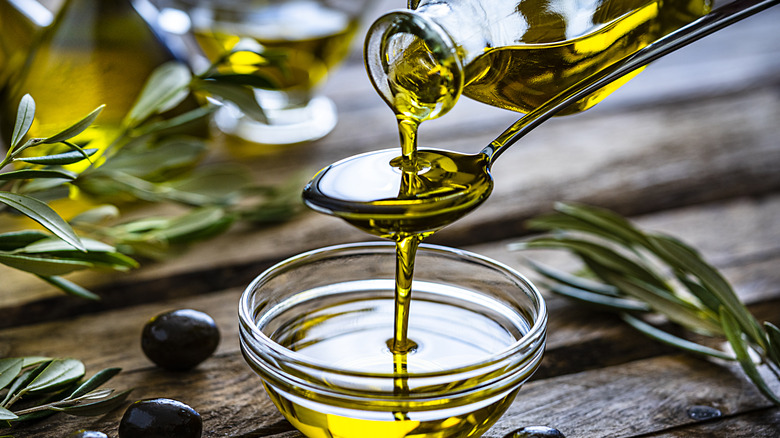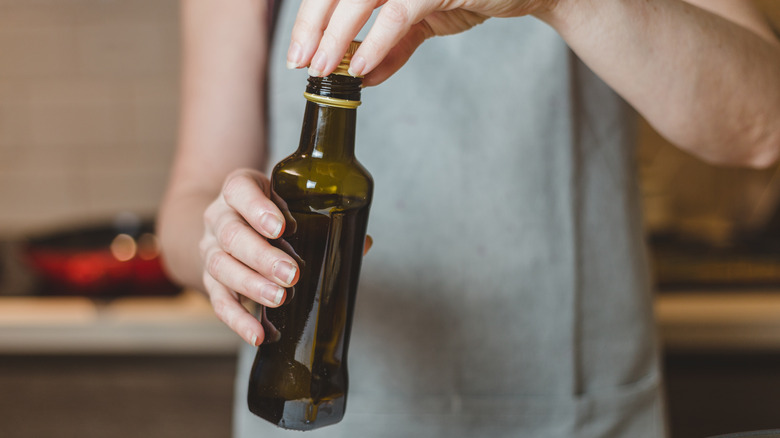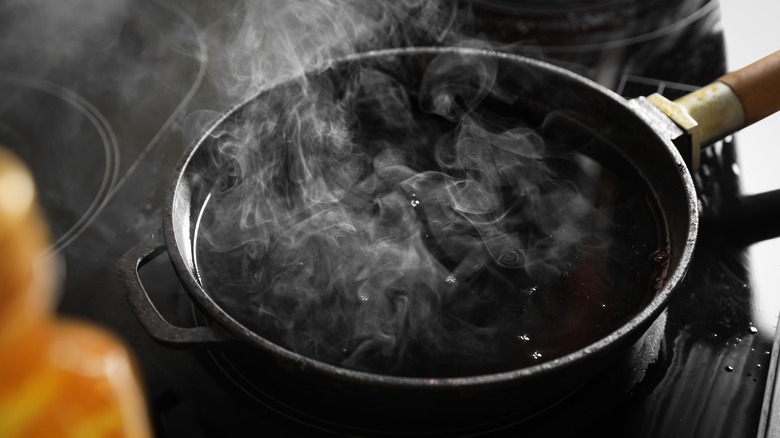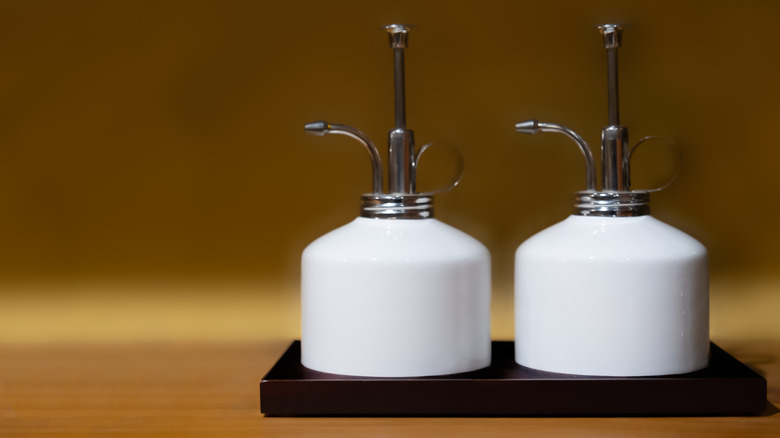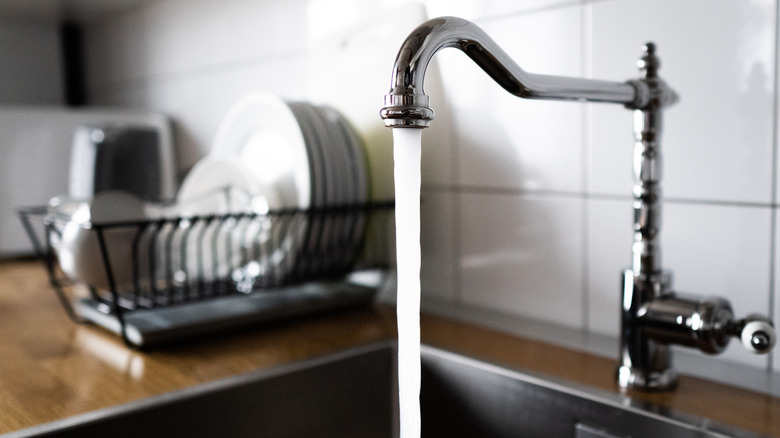What You Need To Know Before Buying An Olive Oil Cruet
Extra virgin olive oil is good for so much more than just dressing salads and roasting vegetables. Whether you start your day with a homemade olive oil coffee or end it with a savory drizzle atop your favorite dessert, there are few foods and drinks that wouldn't benefit from a little quality olive oil. If you find yourself reaching for olive oil at all hours of the day, perhaps you've considered acquiring a cruet to store your supply of liquid gold in a smaller, prettier container than the average bottle. Besides its aesthetic appeal, a cruet offers a variety of advantages, in particular its ability to comfortably and easily control the quantity of oil released during the pouring process.
However, you should also be aware that it can affect the quality of olive oil. Because olive oil is a fresh fruit juice, it degrades quickly when exposed to air, light, and heat. Transferring olive oil from its original container into a cruet can negatively impact its flavor profile and nutritional content.
Minimize your olive oil's exposure to air
If you've ever sliced an apple or banana into pieces, then left it on the counter for a while and returned to find the pale flesh has begun to brown, you have seen some of the harsh effects of oxygen on fresh fruit. Olives, as a kind of fruit, are similarly affected. While you won't see olive oil turn from golden green to brown in just a few minutes, exposure to air does have consequences, even in just the short time it takes to pour olive oil from its bottle into a cruet.
In moving the olive oil from one container to another, the liquid comes into contact with the air, which causes rancidity to occur sooner. This not only incurs slight changes to the color of the oil, but also alters its flavor, aroma, and nutritional value. Do not allow your olive oil to remain opened for long periods of time, and make sure the lid is always securely fastened. A cruet with a cork top may be cute, but it is not airtight and, therefore, best avoided.
Store your olive oil in a dark place or dark container
While olive oil will be exposed to air only briefly while being transferred into a cruet, your choice of container and where to store it will affect the oil's long-term exposure to light, which can be equally damaging. If olive oil is kept in a clear bottle and in a place where it receives direct sunlight, it will quickly go rancid. This affects both the sensory experience of enjoying the oil and the nutritional content absorbed by consuming it. In particular, too much light can result in a loss of antioxidants.
In a cruet or any other container, olive oil should be stored in a container made of an opaque material and kept in a dark, dry space, such as a pantry. This may be less convenient than keeping your cruet within reach on the counter or table, but it will guarantee the quality of your olive oil remains at its best.
Keep your cruet away from sources of heat
Besides air and light, exposure to high temperatures can also be harmful to olive oil. Up until the moment you begin cooking with olive oil, you should store it away from any sources of heat, including your oven or a sunny window, to prevent it from developing an unpleasant, rancid flavor. Ideally, olive oil should be stored somewhere where the temperature remains between 55 and 60 degrees Fahrenheit. Don't worry about maintaining this exact temperature in your kitchen at all times, but if your cooking space tends to warm up much beyond that, find a cool shelf in the pantry for your olive oil bottle.
If you choose to use a cruet, finding a proper storage space is especially important, since the material may not be as protective as the bottle selected by the oil's producer. Ceramic and glass cruets are both good options to consider, since they don't conduct heat well.
Recommendations for finding the best cruet
Leaving your olive oil in its original packaging is certainly the easiest option, but if you prefer to have a certain style to your kitchenware, there are cruets that will elegantly and effectively hold your olive oil. Make sure to buy one that is made of ceramic or a dark glass to prevent light or heat exposure. It should also have an airtight lid to limit oxidation.
The size and shape of the cruet matter, too. Find one that is small enough and light enough to fit comfortably in your hand. This will optimize maneuvering while pouring for the perfect drizzle and make you excited to put it to use every day. In this way, you'll quickly move through the contents of the bottle. The normal shelf life of olive oil can span up to 18 months or so, but this expiration date is probably shortened with the use of a cruet.
Keeping your cruet clean
After you have purchased your cruet, it is important for both quality and safety purposes that you understand the best practices for cleaning it. You should be thoroughly washing your cruet every three months, or at least a few times a year. Don't worry about sticking with a precise calendar date — you can base your cleaning schedule more conveniently around how often you finish using all the oil in the bottle. In between cleanings, make sure that you use every last drop of oil, rather than topping it up. This will help prevent your oil from going rancid.
To clean your cruet, wash the bottle and lid in hot water with dish soap. You can allow it to soak for a while or insert a narrow bottle brush if any residue remains inside. After rinsing, let the cruet air dry completely on your countertop before refilling it with olive oil.

